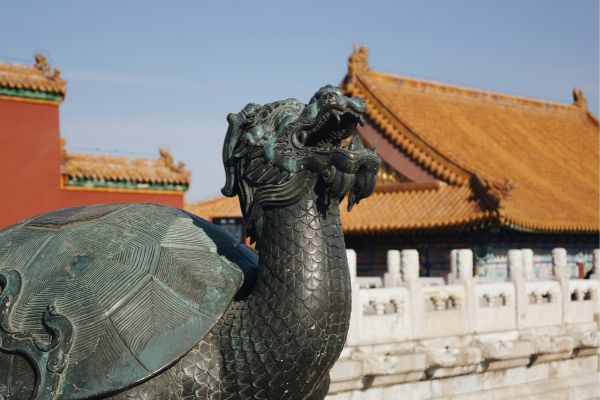
China’s Supreme Court reports annually not only its own work to the National People’s Congress, but also the work of local courts throughout the country.
The reporting system of the Courts to the People's Congress requires that each court in China report its work of the previous year to the People's Congress at the same level every year, and the report be voted by the People's Congress. In particular, the Supreme People's Court (SPC) reports annually not only the its own work to the National People’s Congress (NPC) , but also the work of local courts throughout the country.
As China’s legislative body, the People's Congress is also considered as the organ of state power, which can elect the president of the court and supervise the court at the same level. Listening to the report from the courts is a main approach of this supervision system.
This means that the Chinese courts and the legislative body are not independent of each other. Professor Hou Xinyi (侯欣一) described the formation of this mechanism in an article titled “The Formation and Development of the Court Reporting System to the People's Congress: The Annual Report of the Supreme People's Court as an Example” (法院向人民代表大会报告工作制度的形成及发展:以最高人民法院年度报告为例), published in “The Jurists” (法学家), (No. 5, 2020).
I. Initial formation
Not long after the foundation of the People's Republic of China in 1949, there was a debate on how to handle the relationship between the Courts and the People's Congress.
In July 1950, the SPC, the Supreme People's Procuratorate (SPP), the Ministry of Justice, and the Legislative Affairs Commission jointly convened the First National Conference on Judicial Work. At the Conference, it was initially proposed that the courts should not be independent, i.e., the independent judicial system featuring separation of powers and the unreasonable lifelong system of judges were not responsible to the people; the people's courts constituted an integral part of the people's power, the presidents and judges of the people's courts should be appointed and removed by the People’s Congress or People's Government Committee, and should be responsible to and report to its appointment and removal authority. [1]
It was the first time the view that the Courts should report to the People's Congress has emerged, which had a profound impact in shaping today’s judicial system in China.
Later, when the first PRC Constitution was promulgated in 1954, the mechanism for the Courts to report to the People’s Congress was formalized. Article 80 of the Constitution provided that the SPC is responsible and accountable to the National People's Congress, and to its standing committee when the National People's Congress is not in session. Local people's courts at all levels are responsible and accountable to the People's Congresses at their respective levels.
The Organic Law of the People’s Courts, enacted in the same year, also confirmed the mechanism established in the Constitution.
II. Reconstruction after the Cultural Revolution
During the Cultural Revolution from the 1960s to the 1980s in China, neither the Courts nor the People's Congress functioned properly, and the role of the Courts in state powers was significantly reduced.
After the Cultural Revolution, China began to rebuild the state power system. The Constitution promulgated in 1982 reaffirmed that the Court should be responsible to the People’s Congress at the same level, but made no mention of the Courts’ report to the People’s Congress.
The Organic Law of the People’s Courts promulgated in 1983 further stated that the Courts are responsible to and report their work to the People’s Congress at the same level. The law was drafted by the SPC. The proposed incorporation of the reporting system into the Law was probably designed for the courts to gain more attention from people’s representatives to their work and to improve their political status that had been weakened during the Cultural Revolution.
Since the court system had the demand to report its annual work to the People’s Congress, the NPC was naturally willing to accept such practice. Thus, in April 1989, the NPC adopted the “Rules of Procedure of the National People's Congress”(全国人民代表大会议事规则). The rules formally stipulated that the State Council, the SPC, and the SPP should report to the NPC, and the NPC could vote and make resolutions on the reports.
III. Specification of the systems
Although the voting results of the People’s Congress on the Courts do not directly affect the Courts, the number of votes and the ranking can lead to competition among the voted organs, namely, the State Council, the SPC, and the SPP.
Gradually, the SPC came to believe that the voting result would influence the courts’ social image, and began to pay increasing attention to the attitude of People’s Congress toward its report.
In 1986, for the first time, there had been, though very few, negative votes and abstentions when the NPC voted on the annual work report of the SPC.
In 1990, the NPC began to use electronic voting machines, resulting in an increasing number of negative votes and abstentions to the SPC’s report. According to statistics, between 1999 and 2008, the approval rate for the annual work report of the SPC was basically lower than 80%, and in some years even barely reached 70%. By contrast, the approval rate for the government's work report during the same period was consistently above 97%, thus putting pressure on the leaders of the SPC.
In addition, the work report of Shenyang Intermediate Court failed to be approved by the local People's Congress in 2001, which had greatly shocked all courts in China.
Therefore, the SPC made more careful preparation for presenting the annual work report to the NPC.
After the lowest approval rate record in 1997, the SPC issued “Several Opinions on the People's Courts Accepting Supervision from the NPC and its Standing Committee” (关于人民法院接受人民代表大会及其常务委员会监督的若干意见) in December 1998, emphasizing better communication between the Courts and the People’s Congress. For example, a liaison office was established to strengthen daily communication with the people’s representatives, the people’s representatives were hired to serve as the court supervisors, the president of the court visited the people’s representatives before the meeting of the People’s Congress, and the court performance was published in court journals and newspapers.
In addition, the SPC continues to optimize its reports to the NPC and makes them more readable, for example, to organize the content in a way that meets the needs of the people’s representatives, to make the text easier to understand, and to use pictures and icons as much as possible.
At present, the reporting process has also become more sophisticated. Initially, this reporting process consisted of the following steps: the SPC writes the report, presents it to the NPC, and receives a vote from the NPC.
Now, the system has evolved into a series of steps: the SPC seeks advice from the people’s representatives, prepares a draft report, submits it to the NPC for pre-approval, makes a formal report to the NPC, receives deliberations from the NPC representatives, makes appropriate revisions, receives a vote at the Congress, and holds a special session to implement the recommendations of the people’s representatives, etc.
IV. Comments
It is noteworthy that under the 1982 Chinese Constitution, the Courts exercise judicial power independently, without interference from the administrative organs. This indicates that the Courts are independent of the Government.
However, the People’s Congress appoints presidents of the courts at the same level and receives reports from them, which indicates that the court is still not independent of the legislature body (or organ of state power). This is one of the characteristics of China's constitutional system. The theory behind it is that “the people's courts should be accountable to the people, i.e., to the people's elected representatives”. Understanding this is helpful in making reasonable predictions about how the Courts will behave.
[1] 法制委员会主任陈绍禹在1950年7月第一届全国司法工作会议上《关于目前司法工作的几个问题》的报告
Contributors: Guodong Du 杜国栋









